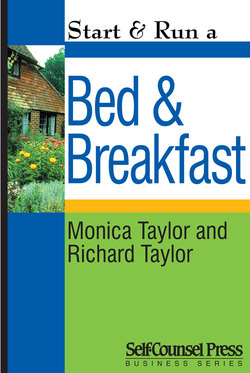Читать книгу Start & Run a Bed & Breakfast - Richard Taylor - Страница 38
На сайте Литреса книга снята с продажи.
4. Levels of Taxation
ОглавлениеAs consumers, we are constantly faced with ever-increasing taxes, and we have very few ways of recovering those taxes. By starting a B&B, you will join the world of small business, and you will find additional deductions that can be claimed as legitimate business expenses, thus relieving your total tax burden.
As part of your business responsibilities, you will be asked to collect certain taxes and to remit them to various levels of government. Tax regulations are complex and inconsistent, and they vary from one to another. We strongly urge you to consult your accountant, your municipality, your province or state, and your federal government to make sure that you are aware of your tax rights and responsibilities.
The areas of taxation generally fall into the following categories.
(a) Income tax: The federal government is interested in the total revenue of your B&B operation. How they tax that total revenue depends on the structure of your business; an accountant can provide the best advice on effective tax planning.
(b) Sales tax: Most state and provincial governments have some form of taxation on the sale of goods or services. These taxes are not consistent among jurisdictions, and some governments have chosen to exempt B&Bs from collecting sales tax.
Check with your state or provincial government taxation authorities, and if you are required to collect sales tax, make sure that you register with the appropriate authority and obtain the correct permits.
(c) Room tax: Municipal governments often impose a hotel/motel room tax to generate additional revenues. You should check with your municipality to see if they impose this tax. Some municipalities exempt B&Bs.
(d) Goods and Services Tax (GST) and Harmonized Sales Tax (HST) in Canada: If your business is located in Canada and generates an income of at least $30,000 per year, you must register with the appropriate tax agency for remittance of sales taxes. In most provinces and territories, taxes are remitted to Canada Revenue Agency (CRA). In Quebec, taxes are remitted to Revenu Quebec.
If you are registered with a tax agency, you must charge your guests sales tax on their transactions, and remit the taxes. This sales tax is usually called GST, but some provinces have replaced the GST with the HST, which combines the GST with their own Provincial Sales Tax. Ontario, Newfoundland/Labrador, and New Brunswick have an HST of 13 percent, Nova Scotia has 15 percent, and British Columbia has 12 percent. These figures are subject to change; check with your local tax agency for up-to-date information.
If your business generates less than $30,000 per year, you have the option not to register with the tax agency. In that case, you would not collect taxes from your customers. Keep in mind that most groceries are tax-exempt; however, taxes may be charged on paper products, garbage bags, cleaning supplies, and so on. Services such as accountants, booking agents, and contractors must often charge GST or HST as well. Note that sales taxes on business purchases can be recovered as a business expense.
Most small B&B operators in our area have chosen not to register with a tax agency. You must be the final judge, but let your accountant be your guide.
